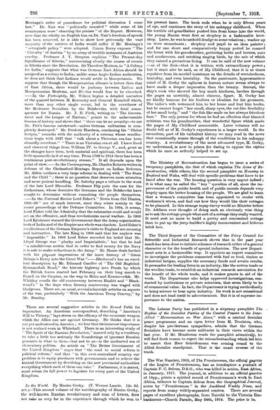In the World. By Maxim Gorky. (T. Werner Laurie. 12s.
6d. net.)—This second volume of the autobiography of Maxim Gorky, the well-known Russian revolutionary and man of letters, does not take us very far in the experience through which he won to his present fame. The book ends when he is only fifteen years of age, and continues the story of his wthappy childhood. When his terrible old grandfather pushed him from home into the world, the young Maxim went first as ahopboy in a fashionable boot- shop. Later, he was household drudge to some relatives ; washer-up on river steamboats ; ehopboy and pupil to an ikon painter ; and for one short and comparatively happy period he roamed the forest with his grandmother, gathering herbs and berries, nuts and mushrooms, and catching singing birds, by the sale of which they earned a precarious living. It can be said of the new volume —as of the first--that it is written with extraordinary power ; but it must also be said, as of My Childhood, that it is at times repulsive from its morbid insistence on the details of wretchedness, brutality, and even bestiality. On the passionate, hypersensitive mind of M. Gorky the ugliness in human nature seems always to have made a deeper impression than the beauty. Smouri, the ship's cook who showed the boy much kindness, lurches through the pages an unwieldy, almost obscene, figure. M. Gorky has no kindly humour for his frailties or idealism for his grossness. The tailor's wife welcomed him to her home and lent him books, but he cannot forget "her small, sharp eyes, the eat-like flexibility of her small body," and " the fish-like smile on her always frivolous face." The only person for whom he had an affection that blunted criticism was his grandmother, that wonderful figure which made the pages of My Childhood memorable. Later volumes will no doubt tell us of M. Gorky's experiences in a larger world. In the meantime, part of his turbulent history we may read in the news that occasionally comes through of the conditions in his unhappy country. A revolutionary of the most advanced type, M. Gorky, we understand, is now in prison for daring to oppose the regime which he once so ardently helped to set up.


























 Previous page
Previous page